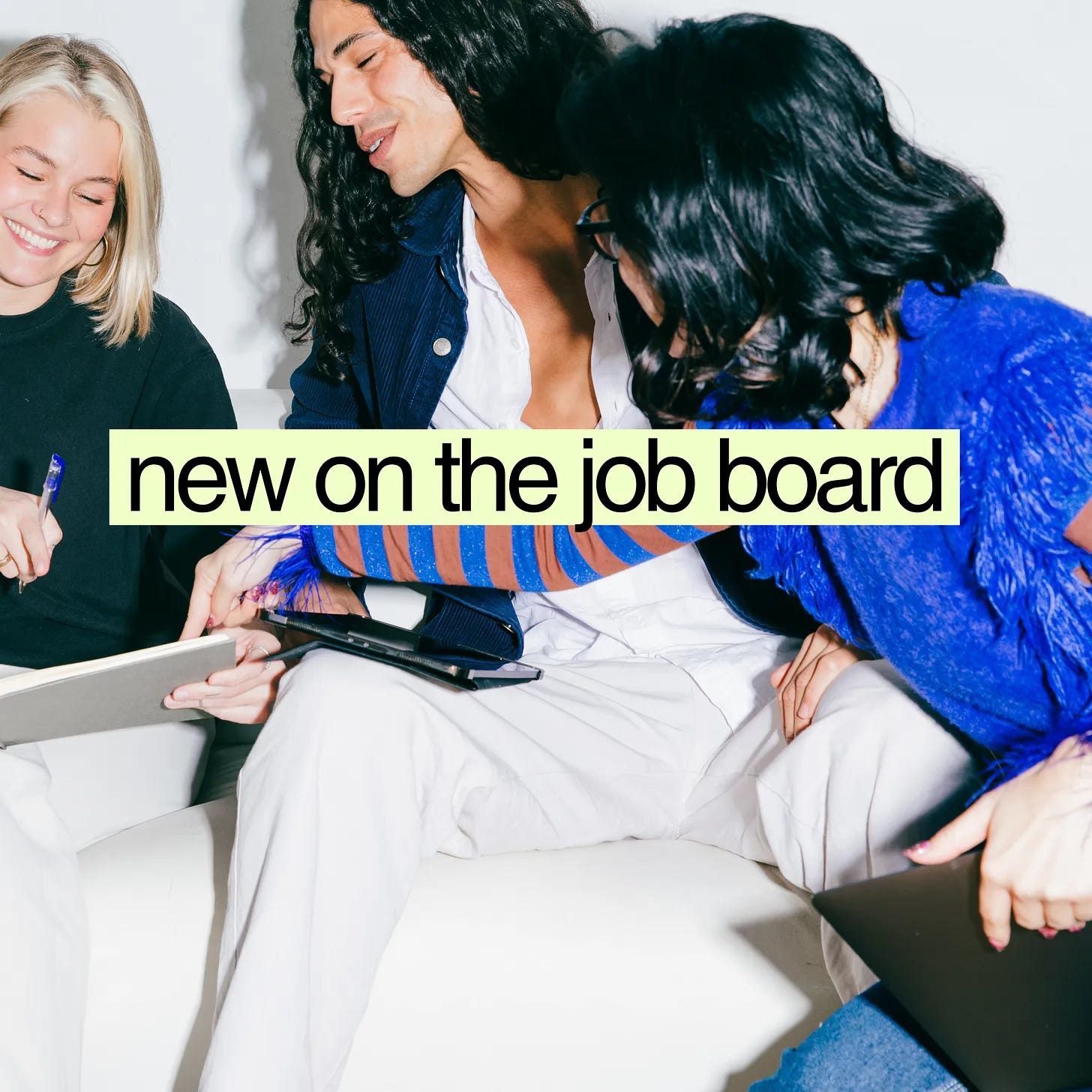The U.S. Released First-Ever Federal Report on Textile Waste, EU Plans to Simplify Key Sustainability Regulations, Bangladesh Raises Wages, Texas Files Lawsuit Over PFAS Safety Claims and More!
Here's what everyone is talking about in sustainable fashion news this Week/End.
December 14, 2024
Welcome to Week/End—your quick-hit guide to the week’s need-to-know sustainability news at the intersection of fashion, business, and ethics. Every Saturday, we deliver a curated recap of the most important industry updates straight to your inbox. No endless scrolling, no juggling multiple sources—just everything you need, in one simple, streamlined email. Think of us as your shortcut to staying informed and ready to lead the conversation—without the overwhelm.
TL;DR — here’s what happened this week in sustainable fashion news:
The U.S. released a federal report acknowledging textile waste as a significant concern.
The EU announced plans to simplify key sustainability regulations.
Cascale formed a U.S. Policy Advisory Group.
Bangladesh announced a 9% wage increase.
Better Buying Institute raised concerns over how brands' pricing strategies impact supplier relationships.
Stand.earth released a report linking fashion to fracking.
ZDHC shared guidelines to address chemical management during the production of recycled polyester.
Texas filed a lawsuit over PFAS safety claims.
...and more industry news you won’t want to miss! Let’s dive in!
U.S. Acknowledges Textile Waste as a Significant Issue in Landmark Federal Report
The U.S. Government Accountability Office (GAO) released its first-ever report addressing the environmental and systemic challenges posed by the growing surplus of discarded textiles, marking the first federal acknowledgment of this issue as a significant concern in the U.S.
The report reveals a 50% increase in textile waste between 2000 and 2018, driven largely by fast fashion and insufficient recycling infrastructure. To tackle these challenges, GAO recommends the establishment of an interagency mechanism involving the EPA, NIST, and the Departments of State and Energy, while urging Congress to consider a national management strategy.
While promising recycling technologies are emerging, obstacles like limited collection systems and the complexity of materials persist. The report emphasizes the need for improved federal coordination to overcome these barriers and create a more sustainable future for the industry.
EU Plans to Simplify Key Sustainability Regulations with Omnibus Package
What’s going on: The European Commission is reportedly planning to simplify three major sustainability regulations under the EU Green Deal through an Omnibus Simplification Package. The package is expected to target the EU Taxonomy for Sustainable Activities, the Corporate Sustainability Reporting Directive (CSRD), and the Corporate Sustainability Due Diligence Directive (CSDDD). This initiative aims to reduce administrative burdens and streamline processes, which could modify how fashion brands collect and report data related to environmental and social impact.
The details: The goal is to reduce the regulatory burden on businesses, particularly SMEs, by addressing redundancy and overlap in reporting requirements. While the core content of the laws will likely remain intact, the reforms aim to streamline the data collection process.
The proposed changes follow political shifts in the 2024 European Parliament elections, where concerns over regulatory burdens on businesses gained traction. The European Commission is expected to present the first Omnibus Simplification Package in the first quarter of 2025, with February 26, 2025, having been reported by multiple sources as a possible publication date.
The fashion industry’s response: Climate and labor activists, however, are concerned that these changes could weaken the original intent of the regulations and undermine environmental and social protections
💡Do you think the EU's plan to simplify its sustainability regulations will help businesses, undermine protections, or lead to something else? Share your thoughts by voting below.
Think the EU's plan will have another outcome? Join the conversation and drop your thoughts in the comments!
Cascale Formed U.S. Policy Expert Team to Shape Sustainable Fashion Advocacy
Cascale, formerly the Sustainable Apparel Coalition, launched the ‘U.S. Policy Member Expert Team (MET)’, an advisory group tasked with defining policy priorities and guiding regional advocacy strategies for the textiles, apparel, and consumer goods sectors. The MET includes representatives from brands, manufacturers, and affiliates, bringing together industry expertise to provide recommendations on key legislative and regulatory matters during the current U.S. legislative cycle.
While the MET’s work is informed by the perspectives of its members, its advocacy efforts will have implications for the broader industry, as the policies it helps shape will influence the entire sector. The MET will focus on identifying pressing policy priorities and determining whether efforts should be concentrated at the federal or state level.
Bangladesh Announces 9% Wage Increase for Garment Workers Amid Protests
The Bangladeshi government approved a 9% annual wage increase for workers in the ready-made garment (RMG) sector following negotiations with worker representatives and factory owners. The decision, which includes a 4% additional adjustment on top of the standard 5% annual increment, will take effect in December salaries, according to Labour and Employment Adviser Brigadier General (retd) M Sakhawat Hussain.
Worker representatives had proposed a 10% increase to address rising living costs, while manufacturers lobbied for an 8% raise, citing financial constraints. Factory owners expressed concerns over the economic impact, with many highlighting difficulties in absorbing the added costs. Despite the announcement, strikes persisted in several factories as workers demanded a 15% raise and a Tk25,000 minimum wage. A government-formed committee will assess the feasibility of these demands over the next six months.
Better Buying Institute Finds Less Than Half of Suppliers Are Paid Enough to Turn a Profit
New research from the Better Buying Institute reveals that some costing practices by global brands and retailers continue to place financial strain on suppliers, despite efforts to improve. The report, ‘Suppliers’ Perspectives on Solutions for Better Costing,’ highlights that fewer than half (48.9%) of suppliers reported being paid prices that covered production costs and allowed for profit. Among those whose costs were not covered, 81.9% cited inadequate payments for raw materials, components, and labor.
The report underscores the need for cost models that account for all variables and avoid practices that pit suppliers against one another. Suppliers highlighted the importance of open communication, long-term relationships, and reduced price pressures as effective ways to improve outcomes. The Better Buying Institute urges buyers and stakeholders to include supplier input in their costing strategies and adopt fair practices to avoid unintended consequences.
Texas Files Lawsuit Against 3M and DuPont Over PFAS Safety Claims
Texas Attorney General Ken Paxton has filed a lawsuit against 3M, DuPont, and Corteva, alleging that the companies misrepresented the safety of products containing per- and polyfluoroalkyl substances (PFAS). These chemicals, used in household brands like Teflon, Scotchgard, and Stainmaster, were marketed as safe despite decades of evidence linking them to health risks and environmental persistence.
PFAS are also commonly used in stain-resistant and water-repellent coatings for textiles, including apparel and home furnishings, raising questions about their role in fashion and whether the industry could face similar legal challenges. The lawsuit seeks financial penalties and injunctive relief to prevent future sales and misrepresentation of PFAS-containing products.
INSIGHTS:
► Public Eye released new report, ‘One-Earth Fashion’ outlining 33 measurable targets to reform the global fashion system by 2030. The report identifies 12 key areas for transformation, including overproduction, greenhouse gas emissions, waste, and workers’ rights. Specific goals include reducing virgin material use by 40%, halving non-recovered clothing waste, ensuring living wages across global supply chains, and cutting greenhouse gas emissions by at least 60% compared to 2019 levels.
► Stand.earth released a new report highlights how the fashion industry contributes to the fracking-derived petrochemical sector through its use of virgin polyester. Over 100 brands, including Inditex and Lululemon, are linked to synthetic fibers produced from fracked natural gas. The report calls for a reduction in fossil fuel-derived materials and increased investment in textile recycling to mitigate environmental impacts.
MANUFACTURING:
► The ZDHC Foundation, a global chemical management group, released Recycled Polyester Guidelines V1.0 and Industry Standard Implementation Approach V1.0 to address sustainable chemical management in recycled polyester production. The guidelines provide requirements for input, process, and output management, covering bottle-to-textile and textile-to-textile recycling. They emphasize safe chemical use, recovery, storage, worker safety, and minimizing environmental emissions from wastewater, sludge, and air.
► Cambodia, Costa Rica, India, and five other nations have launched a $45-million, six-year initiative funded by the Global Environment Facility to reduce hazardous chemicals in the fashion and construction industries. Led by UNEP, UNDP, UNIDO, and FAO, the program aims to transform supply chains by promoting sustainable materials, resource-efficient production, and improved post-use collection. The initiative, which leverages an additional $295 million in funding, is expected to prevent the release of 6 million metric tons of GHGs and restore 825,000 hectares of land by 2031.
SOURCING:
► Puma signed a multi-year, non-binding Letter of Intent with Woodspin, a joint venture between Spinnova and Suzano, to secure volumes of wood-based Spinnova fiber for future collections. The collaboration will focus on developing proof-of-concept products for PUMA’s Sportstyle category.
► The Leather Working Group released a comprehensive Life Cycle Assessment (LCA) report analyzing the environmental impact of producing one square meter of finished leather. Conducted by Spin 360, the report evaluates 50 leather products across six categories, including footwear, furniture, leather goods, and automotive upholstery, covering the entire production process from raw material sourcing to manufacturing. It highlights key environmental contributors, such as raw material sourcing and post-tanning processes, while offering actionable insights to help stakeholders reduce their environmental footprint.
► Hugo Boss announced the launch of Eightyards GmbH, an independent entity dedicated to recycling and reusing surplus materials, set to begin operations in January 2025. Fully owned by Hugo Boss AG and headquartered in Metzingen, Germany, Eightyards will initially manage the company’s surplus fabrics, with plans to expand into other industries in the future, according to its press release.
INNOVATION:
► Unspun introduced FitOS, a platform that uses body scanning and AI to recommend clothing sizes, aiming to reduce return rates by up to 50%. The platform generates personalized size recommendations based on consumer data, including 3D body scans, and helps brands optimize inventory and adjust designs. FitOS integrates with existing production systems to enable on-demand manufacturing and reduce surplus stock. It also provides tools for brands to refine size curves and patterns, aligning products more closely with customer needs.
Under Armour | Professional, Sustainability & Product Operations
Baltimore, MD | Hybrid・Full-Time・Entry Level
$71K/yr - $97.7K/yr
→ Apply hereKontoor Brands | Sustainability Intern
Greensboro, NC | Full-Time・Internship
→ Apply hereNike | Circularity Strategy Manager
Beaverton, OR | Hybrid・Contract・Mid-Senior Level
→ Apply here
Ralph Lauren | Transparency & Traceability Lead
Watford, England, United Kingdom | Full-Time・Director
→ Apply here
Hiring for roles in Sustainability, Social Impact, or DEI? Kind World Collective specializes in recruiting purpose-driven talent for organizations like yours.
Email them at hello@kindworldcollective.com for a free consultation and discount on their recruiting services when you mention the Sustainable Fashion Forum!
▶︎ Was this post helpful? → Forward it to a colleague/friend or share it on LinkedIn!
▶︎ Not a Week/End subscriber? → Join thousands of industry pros, sustainability leaders, and forward-thinking brands—subscribe now!
▶︎ Want to advertise with us? → Let’s chat!































Lot's interesting insights presented here. Happy for the people of Bangladesh, but I assume even 9% isn't enough to thrive in this life! I hope this report that the US Government Accountability Office (which I didn't even know exists and, frankly, feels very ironic considering how entitled and hypocritical the US can be when it comes to taking accountability) inspires legislation. Not only on the development and proliferation of fast fashion but the brands and their holding companies that endorse the insane amount of waste in the fashion industry!!
💬 What’s your take on this week’s news? Share your thoughts in the comments below, and we might feature your response in next week’s newsletter!